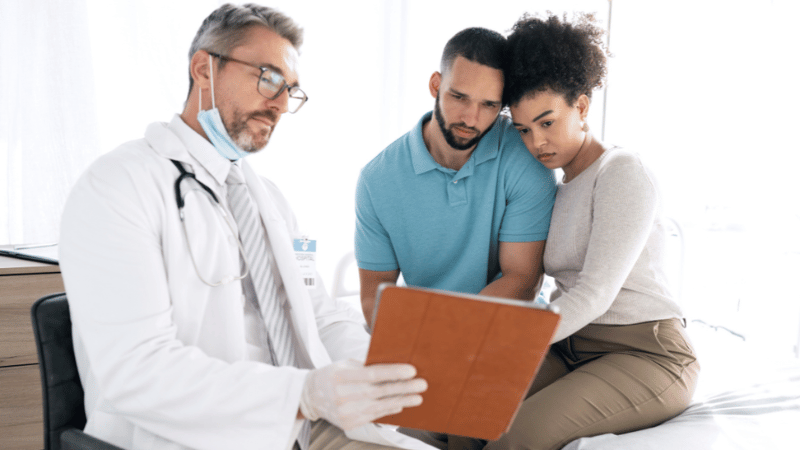
Are you wondering if you can get pregnant if you have fibroids?
The answer can vary from person to person. Many women can become pregnant naturally without the need for infertility treatment and have a successful pregnancy with having fibroids, while others may have issues conceiving due to having uterine fibroids.
Fibroids can impact your fertility and lead to pregnancy complications. Schedule an initial consultation with a fibroid specialist if you are concerned about how fibroids can affect your pregnancy. A fibroid specialist can help you determine if fibroid treatment is right for you before getting pregnant.
What are the Chances of Getting Pregnant with Fibroids?
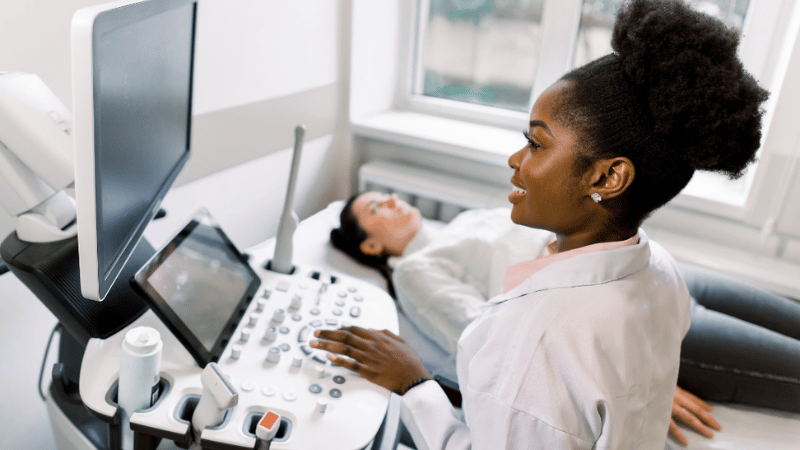
A common question many women with fibroids wonder is, “Can fibroids prevent pregnancy?” Most of the time, fibroids will not prevent women from getting pregnant. There are cases, though, where fibroids may have been the sole cause of infertility, however, birth rates appear to be low in women with submucosal versus subserosal fibroids. (1)
The size and location of the fibroids can lead to pregnancy complications, including increasing the risk of a C-section and premature or breech birth.
Schedule an initial consultation with a fibroid specialist if you are concerned about how fibroids can affect your pregnancy. A fibroid specialist can help you determine if fibroid treatment is right for you before getting pregnant.
Complications of Getting Pregnant With Fibroids
Many women can have a successful pregnancy with fibroids without any complications. Some women, however, experience challenges in getting pregnant with fibroids.
For instance, if your fibroids grow on the inner wall of your uterus or in your uterine cavity, they could affect the implantation and growth of the embryo, leading to a miscarriage or infertility.
Uterine fibroids can reduce fertility in various ways, including:
- Changes to the cervix shape impact the number of sperm entering the uterus.
- Uterus shape changes can interfere with the sperm’s or embryo’s movement.
- Affects the size of the uterine cavity’s lining.
- Blocks the fallopian tubes.
- Affects the flow of blood to the uterine cavity, thus decreasing the embryo’s ability to implant in the uterine wall or develop.
While a fibroid diagnosis and past struggles with infertility may feel daunting, becoming pregnant and carrying a healthy baby with fibroids is possible. A fibroid specialist can help diagnose if fibroids may be causing your infertility and check for other potential causes. Fibroid specialists will work with you to create a personalized treatment plan that is best for your and your baby’s health.
MEET WITH A FIBROID SPECIALIST
Fibroid Symptoms During Pregnancy

Women often learn they have uterine fibroids when they go to their first ultrasound appointment to monitor their baby’s development, but there are symptoms that can point towards having fibroids. Some of the typical symptoms of fibroids during pregnancy can include:
- Severe cramps, similar to menstrual cramps.
- Widespread pain and tension in the stomach.
- Digestion problems, such as constipation.
- Increased need to urinate, as the fibroids exert pressure on the bladder.
Many women who experience fibroid symptoms think they are normal and disregard them. Talk to your doctor if you’re experiencing a combination of these symptoms. Although fibroids can’t be treated during pregnancy, your doctor can help you maintain your health so you can have a successful pregnancy with fibroids.
SCHEDULE A HEALTH CONSULTATION ONLINE
Will My Baby Be in Danger If I Have Fibroids?
If you have fibroids, you’re probably asking questions such as, “Can I carry a baby with fibroids?” and “Will my baby be okay if I have fibroids?” Keep in mind that most affected women can deliver a healthy baby. However, you’ll want to be aware of possible pregnancy complications and risk factors such as growth problems, premature delivery, and malposition.
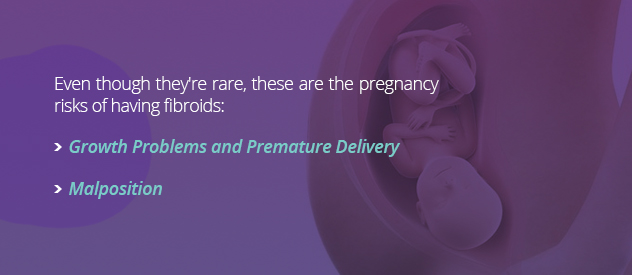
Growth Problems and Premature Delivery
If you have multiple large fibroids, your uterus may fail to distend appropriately, leading to fetus growth issues. Your water can also break early, putting you into premature labor. If your placenta implants on a fibroid, your pregnancy might lack nutrition, and the ideal blood supply needed for your baby to grow properly.
In serious cases, fibroids can lead to extremely preterm births, particularly if your fibroids increase in size rapidly after your pregnancy begins. Your doctor will measure your belly during your pregnancy to ensure your baby grows as it should. If your fibroids are large, they could alter the measurements, making them less accurate so that you may require more frequent ultrasounds.
Keep in mind that most women with fibroids have healthy, growing babies and deliver at term with a natural delivery.
Malposition
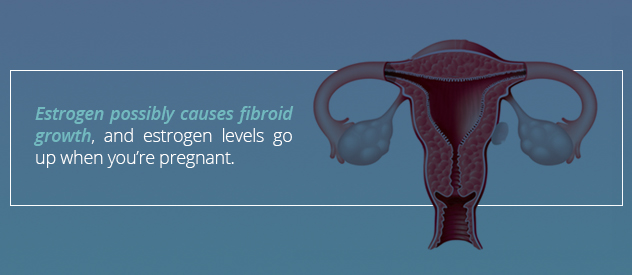
Fibroids can affect the baby’s position within your uterus, causing you to require a C-Section. A few cases of malposition or a baby not being in the correct position include:
- Fibroids affecting the contour of your uterus, so the baby can’t get in position for a vaginal delivery.
- The baby is head down, and large fibroids block the cervix or lower uterine segment, so the baby’s head can’t dilate the cervix properly.
If your doctor suggests a C-section early in your pregnancy, you may want to ask them to monitor the fibroid(s) during the third trimester of your pregnancy.
Being Pregnant With Fibroids details TV personality Shay Johnson’s Fibroid Disease Journey. Johnson, who had revealed she was pregnant, has just come from her doctor’s appointment, where she learned how her previous myomectomy to treat fibroids has now affected her pregnancy and her options for delivery.
Even if the fibroids appeared to be a problem earlier in your pregnancy, as your uterus expands and the fibroids fluctuate in size, they might become less of a concern as your doctor watches your pregnancy.
More Questions? Talk to a Fibroid Specialist Now
Fibroids During Each Trimester
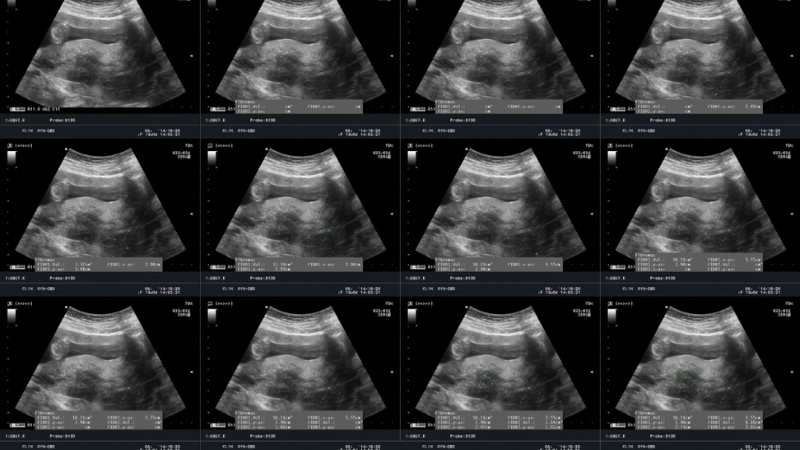
You may be concerned about what happens after you become pregnant and whether you can have a full-term, successful pregnancy with fibroids.
Most fibroids don’t change in size during pregnancy, but if they do, it will likely happen during your first three months.2 During pregnancy, your body produces more of the hormone estrogen, which enables fibroids to grow. During the first trimester, fibroids can cause symptoms and complications such as pain, bleeding, and miscarriage.
Throughout the second and third trimesters, some of the symptoms from the first trimester, such as pain and a higher risk of miscarriage, can increase. However, other complications that may occur in some cases include placental abruption, placenta previa, and preterm delivery.
During Delivery
Fibroids could keep your uterus from contracting. They could also cause birth canal blockage, which slows down the progress of your labor. Fibroids can also impact whether you have a vaginal delivery or a C-Section, and cause issues after giving birth, such as postpartum hemorrhage.
Vaginal Delivery with Fibroids
Some women may find it more difficult to have a vaginal birth if they have fibroids. Fibroids can block the birth canal or lead to the baby being in a breech position. During a breech birth, the baby comes out of the birth canal feet or buttocks first, versus a normal delivery where the baby comes out head first. They can also prevent the necessary contractions from pushing the baby through the birth canal.
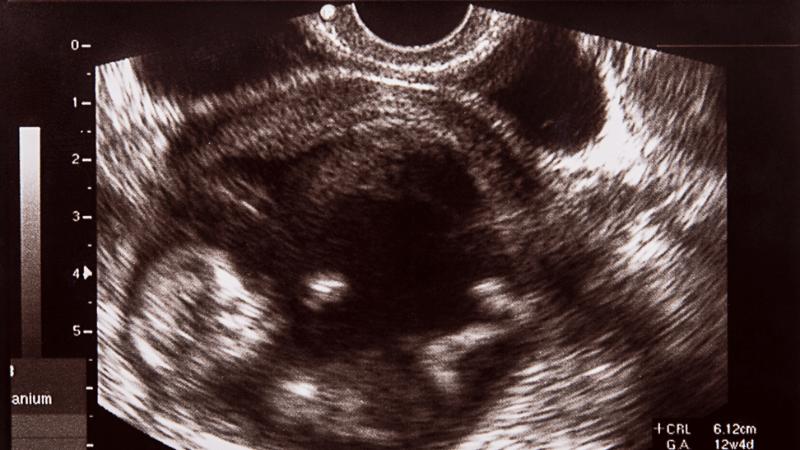
C-Section Birth with Fibroids
A C-section is a surgical procedure that opens up the mother’s abdomen and uterus to deliver the baby. Since fibroids make a vaginal delivery more challenging, women with fibroids are six times more likely to have cesarean section deliveries.³
Your doctor may determine whether you require an emergency C-section during labor or delivery. This can be due to a rapid change if your, or your baby’s, health deteriorates, and vaginal birth becomes too dangerous for you.
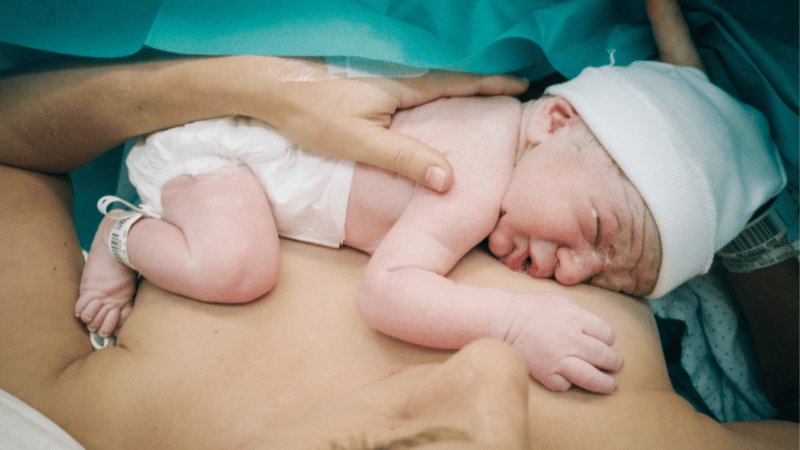
Postpartum Hemorrhage
Fibroids place you at a higher risk for excessive bleeding regardless of whether you had a vaginal birth or C-section. Typically, this occurs when your placenta is attached to your uterus abnormally. For example, placenta increta is when the placenta attaches itself too deeply and firmly into the uterus. There is also placenta acreta, where the placenta attaches even more deeply into the uterus’s muscle wall. You’re more likely to experience abnormal placentation if you’ve had a prior myomectomy or cesarean birth.
Your doctor might request you have an IV in place and ensure there’s blood available exclusively for you during delivery, depending on your fibroid situation. Large obstetric units are usually well-equipped with postpartum hemorrhage protocols to ensure that emergencies are quickly handled.
Recommendations on Having a Successful Pregnancy with Fibroids
There are a few tips on getting pregnant with fibroids, but the best option is to treat the fibroids themselves. Getting pregnant after uterine fibroid embolization, often called fibroid removal, is easier because you are not dealing with symptoms like pain, heavy bleeding, or irregular periods, so you’re feeling better and healthier overall. Since fibroids may make conception difficult, removing them can improve your fertility.
Schedule Your UFE and Speak to a Specialist
It’s only natural to wonder if it’s safe to get pregnant with fibroids, as well as how to have a safe pregnancy and delivery. If you have been diagnosed with fibroids, you can discuss treatment with a fibroid specialist at USA Fibroid Centers. They will help you develop the right treatment plan, whether you are pregnant or planning to have a baby.
Schedule a consultation to learn more about UFE and how it can help you if you hope to get pregnant. You can also call 855.615.2555 to visit one of our facilities.
References
- Damaris Freytag et al., “Uterine Fibroids and Infertility,” Diagnostics (Basel, Switzerland), August 12, 2021, https://www.ncbi.nlm.nih.gov/pmc/articles/PMC8391505/
- Hee Joong Lee, Errol R Norwitz, and Julia Shaw, “Contemporary Management of Fibroids in Pregnancy,” Reviews in obstetrics & gynecology, 2010, https://www.ncbi.nlm.nih.gov/pmc/articles/PMC2876319/
- “Uterine Fibroids,” Uterine fibroids | Office on Women’s Health, February 19, 2021, https://www.womenshealth.gov/a-z-topics/uterine-fibroids.



